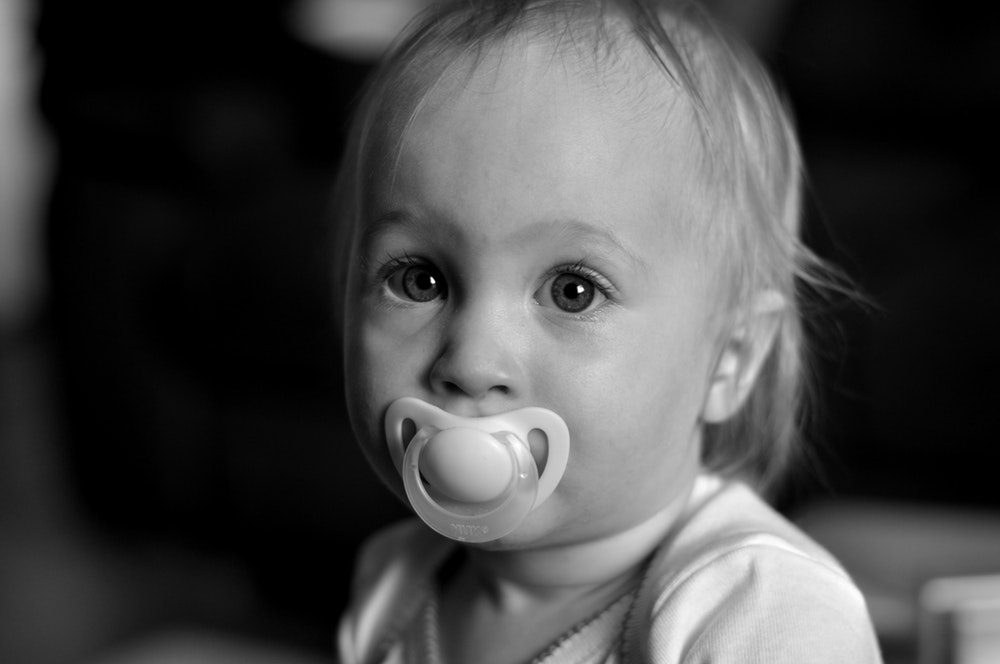Most parents must wage the “great battle of the binky” eventually, although many of them dread the prospect. Pacifier use is something that is a lot like politics: everyone has an opinion, but not everyone shares it. Some parents refuse to give their baby a pacifier. Others offer the pacifier to their baby as soon as they can. Yet others, in despair of ever sleeping again, try to get their child to use a pacifier, and it does not work for some reason, because the baby won’t take it. For those parents whose children grabbed onto their pacy and soon found it to be as indispensable as their diaper or their bottle, there is hope. That battle can be won—it just takes some patience, ingenuity and, sometimes, some subterfuge. So how do I wean my toddler off of the pacifier?
Pacifiers aren’t “evil,” despite what the anti-binky purists say. Most kids will leave their pacifier behind on their own after a while, and those kids that use them don’t have long-term effects from having used them for a long time. Sure, there are some studies which link slightly delayed speech or self-soothing habits to pacifier use, but it isn’t as if the child were bungee jumping or swimming with sharks. However, when your child has pitched a major tantrum in a very public place because they left their binky at home, you will want to end that dependency, as much for your sanity as theirs. Here are some tactics that have had success. Remember that every child is different, so there is no “magic bullet” to this pesky problem.
1. Go cold turkey. This option requires some serious mental and emotional fortitude on the parent’s part, because it can be as traumatic to them as it is to the child. This tactic works best on children with a milder temperament who aren’t as fixated on their pacifier. Some parents “lose” it, others simply take it away and deal with the consequences. Be prepared for some hard-core crying, but since children of this age group have short attention spans and get past things quickly, it might be a viable option for you.
2. Build up to it gradually. This one takes some strategy, but it is accepted as the “best” method by childhood development and psychologists. Start out by pointing out “big kids” to your child while at the playground or the store that aren’t using a pacifier. Set a date in the future for giving up the binky: make a calendar, check off the days with star stickers, and on the big day have them throw it away, with or without a nice reward (some parents think that’s bribery…but it does work sometimes…). Or, invest in a book like The Binky Ba-Ba Fairy, by Heather Knickerbocker-Silva, where a fairy takes children’s pacifiers and give them to younger children in need, and let them feel good about themselves for helping others and being a big boy or girl. None of these methods will stop the child from having some residual pining for the pacifier at certain times, but these esteem-building experiences give something to the child instead of simply taking them away.
3. Interference methods. These are somewhat controversial, but none of them is abusive in any way. These are “old-timey” methods that our moms and grandma’s used before…and they do work. These methods work by interfering in the child’s ability to enjoy their binky. Some moms swear by dipping the pacifier into a cup of strong-brewed coffee or in lemon juice, giving it a bad taste. Some moms will cut a little nick into the “nipple” portion, which changes the pacifier’s smooth texture and makes it harder to suck on.
4. Let the child decide. As stated before, every child is different, and there is no 100% foolproof method of getting a child to stop sucking that pacifier. Sometimes, when you’ve tried everything and it hasn’t worked, you find out that it’s best to allow the child to decide when and where to let the binky go. Many children will wake up one day and mysteriously have no interest in it anymore. Others will go to school, see other kids without pacifiers, and conclude that they don’t need one, either. Regardless of how or when, they will eventually let it go.

